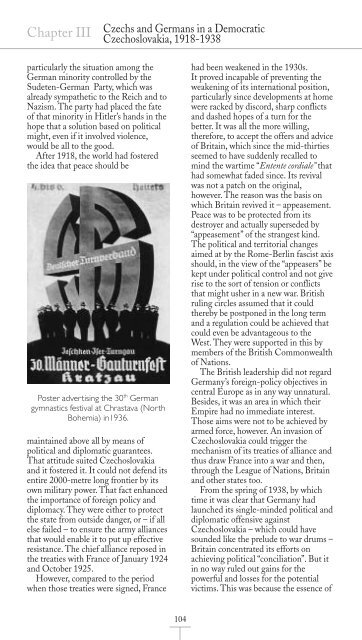the nationality of all inhabitants of the czech provinces and ...
the nationality of all inhabitants of the czech provinces and ...
the nationality of all inhabitants of the czech provinces and ...
Create successful ePaper yourself
Turn your PDF publications into a flip-book with our unique Google optimized e-Paper software.
Chapter III<br />
particularly <strong>the</strong> situation among <strong>the</strong><br />
German minority controlled by <strong>the</strong><br />
Sudeten-German Party, which was<br />
already sympa<strong>the</strong>tic to <strong>the</strong> Reich <strong>and</strong> to<br />
Nazism. The party had placed <strong>the</strong> fate<br />
<strong>of</strong> that minority in Hitler’s h<strong>and</strong>s in <strong>the</strong><br />
hope that a solution based on political<br />
might, even if it involved violence,<br />
would be <strong>all</strong> to <strong>the</strong> good.<br />
After 1918, <strong>the</strong> world had fostered<br />
<strong>the</strong> idea that peace should be<br />
Poster advertising <strong>the</strong> 30 th German<br />
gymnastics festival at Chrastava (North<br />
Bohemia) in1936.<br />
maintained above <strong>all</strong> by means <strong>of</strong><br />
political <strong>and</strong> diplomatic guarantees.<br />
That attitude suited Czechoslovakia<br />
<strong>and</strong> it fostered it. It could not defend its<br />
entire 2000-metre long frontier by its<br />
own military power. That fact enhanced<br />
<strong>the</strong> importance <strong>of</strong> foreign policy <strong>and</strong><br />
diplomacy. They were ei<strong>the</strong>r to protect<br />
<strong>the</strong> state from outside danger, or – if <strong>all</strong><br />
else failed – to ensure <strong>the</strong> army <strong>all</strong>iances<br />
that would enable it to put up effective<br />
resistance. The chief <strong>all</strong>iance reposed in<br />
<strong>the</strong> treaties with France <strong>of</strong> January 1924<br />
<strong>and</strong> October 1925.<br />
However, compared to <strong>the</strong> period<br />
when those treaties were signed, France<br />
Czechs <strong>and</strong> Germans in a Democratic<br />
Czechoslovakia, 1918-1938<br />
104<br />
had been weakened in <strong>the</strong> 1930s.<br />
It proved incapable <strong>of</strong> preventing <strong>the</strong><br />
weakening <strong>of</strong> its international position,<br />
particularly since developments at home<br />
were racked by discord, sharp conflicts<br />
<strong>and</strong> dashed hopes <strong>of</strong> a turn for <strong>the</strong><br />
better. It was <strong>all</strong> <strong>the</strong> more willing,<br />
<strong>the</strong>refore, to accept <strong>the</strong> <strong>of</strong>fers <strong>and</strong> advice<br />
<strong>of</strong> Britain, which since <strong>the</strong> mid-thirties<br />
seemed to have suddenly rec<strong>all</strong>ed to<br />
mind <strong>the</strong> wartime “Entente cordiale” that<br />
had somewhat faded since. Its revival<br />
was not a patch on <strong>the</strong> original,<br />
however. The reason was <strong>the</strong> basis on<br />
which Britain revived it – appeasement.<br />
Peace was to be protected from its<br />
destroyer <strong>and</strong> actu<strong>all</strong>y superseded by<br />
“appeasement” <strong>of</strong> <strong>the</strong> strangest kind.<br />
The political <strong>and</strong> territorial changes<br />
aimed at by <strong>the</strong> Rome-Berlin fascist axis<br />
should, in <strong>the</strong> view <strong>of</strong> <strong>the</strong> “appeasers” be<br />
kept under political control <strong>and</strong> not give<br />
rise to <strong>the</strong> sort <strong>of</strong> tension or conflicts<br />
that might usher in a new war. British<br />
ruling circles assumed that it could<br />
<strong>the</strong>reby be postponed in <strong>the</strong> long term<br />
<strong>and</strong> a regulation could be achieved that<br />
could even be advantageous to <strong>the</strong><br />
West. They were supported in this by<br />
members <strong>of</strong> <strong>the</strong> British Commonwealth<br />
<strong>of</strong> Nations.<br />
The British leadership did not regard<br />
Germany’s foreign-policy objectives in<br />
central Europe as in any way unnatural.<br />
Besides, it was an area in which <strong>the</strong>ir<br />
Empire had no immediate interest.<br />
Those aims were not to be achieved by<br />
armed force, however. An invasion <strong>of</strong><br />
Czechoslovakia could trigger <strong>the</strong><br />
mechanism <strong>of</strong> its treaties <strong>of</strong> <strong>all</strong>iance <strong>and</strong><br />
thus draw France into a war <strong>and</strong> <strong>the</strong>n,<br />
through <strong>the</strong> League <strong>of</strong> Nations, Britain<br />
<strong>and</strong> o<strong>the</strong>r states too.<br />
From <strong>the</strong> spring <strong>of</strong> 1938, by which<br />
time it was clear that Germany had<br />
launched its single-minded political <strong>and</strong><br />
diplomatic <strong>of</strong>fensive against<br />
Czechoslovakia – which could have<br />
sounded like <strong>the</strong> prelude to war drums –<br />
Britain concentrated its efforts on<br />
achieving political “conciliation”. But it<br />
in no way ruled out gains for <strong>the</strong><br />
powerful <strong>and</strong> losses for <strong>the</strong> potential<br />
victims. This was because <strong>the</strong> essence <strong>of</strong>


